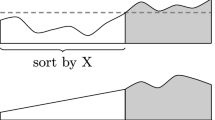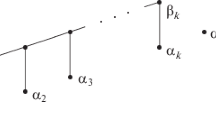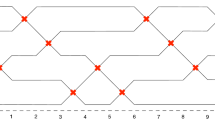Abstract
Sorting algorithms are developed in the setting of iterative multilevel methods. These algorithms borrow aggregation techniques from algorithms used for the numerical solution of elliptic partial differential equations which are of optimal order in running time and storage space for structured problems. A computationally inexpensive preconditioner drives random data chosen from known distributions towards a special case for which the new sorting algorithms are of optimal order.
Similar content being viewed by others
References
A. Aho, J. Hopcroft, and J. Ullman,The Design and Analysis of Computer Algorithms, Addison-Wesley, Reading, MA, 1974.
D. C. S. Allison and M. T. Noga,Usort: an efficient hybrid of distributive partitioning sorting, BIT, 22 (1982), pp. 135–139.
R. E. Bank and C. C. Douglas,Sharp estimates for multigrid rates of convergence with general smoothing and accleration, SIAM J. Numer. Anal., 22 (1985), pp. 617–633.
A. Brandt,Multi-level adaptive solution to boundary-value problems, Math. Comp., 31 (1977), pp. 333–390.
F. Chatelin and W. L. Miranker,Acceleration by aggregation of successive approximation methods, Lin. Alg. Appl., 43 (1982), pp. 17–47.
W. Dobosiewicz,An efficient variation of bubble sort, Info. Proc. Lett., 11 (1980), pp. 5–6.
W. Dobosiewicz,Sorting by distributive partitioning, Info. Lett., 7 (1978), pp. 1–6.
C. C. Douglas,Multigrid algorithms for elliptic boundary-value problems, PhD thesis, Yale University, May 1982. Also, Computer Science Department, Yale University, Technical Report 223.
C. C. Douglas,Multi-grid algorithms with applications to elliptic boundary-value problems, SIAM J. Numer. Anal., 21 (1984), pp. 236–254.
C. C. Douglas and W. L. Miranker,Multilevel sorting algorithms, Tech. Report 14736, IBM Research Division, Yorktown Heights, New York, 1989.
P. J. Janus and E. A. Lamagna,An adaptive method for unknown distributions in distributive partitioned sorting, IEEE Trans. on Computers, 34 (1985), pp. 367–372.
J. S. Kowalik and Y. B. Yoo,Implementing a distributive sort program, J. Inform. Optimaliz. Sci., 2 (1981), pp. 28–33.
H. Meijer and S. G. Akl,The design and analysis of a new hybrid sorting algorithm, Inf. Proc. Lett., 10 (1980), pp. 213–218.
W. L. Miranker and V. Y. Pan,Methods of aggregation, Lin. Alg. Appl. 29 (1980), pp. 231–257.
M. van der Nat,A fast sortin algorithm, a hybrid of distributive and merge sorting, Inf. Proc. Lett., 10 (1980), pp. 163–167.
M. T. Noga and D. C. S. Allison,Sorting in linear expected time, BIT, 25 (1985), pp. 451–465.
Author information
Authors and Affiliations
Rights and permissions
About this article
Cite this article
Douglas, C.C., Miranker, W.L. The multilevel principle applied to sorting. BIT 30, 177–195 (1990). https://doi.org/10.1007/BF02017340
Received:
Revised:
Issue Date:
DOI: https://doi.org/10.1007/BF02017340




